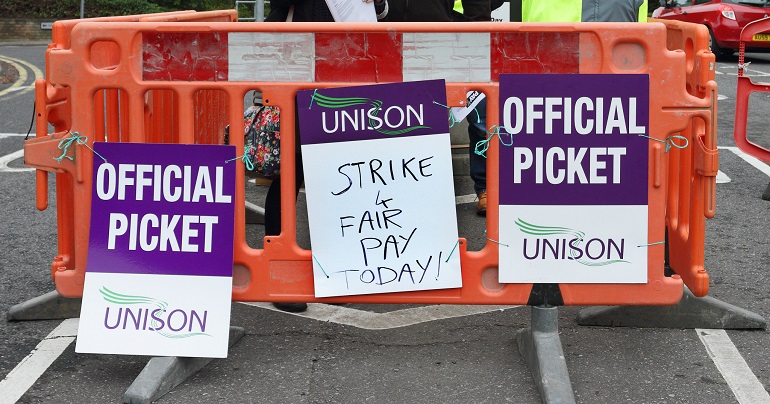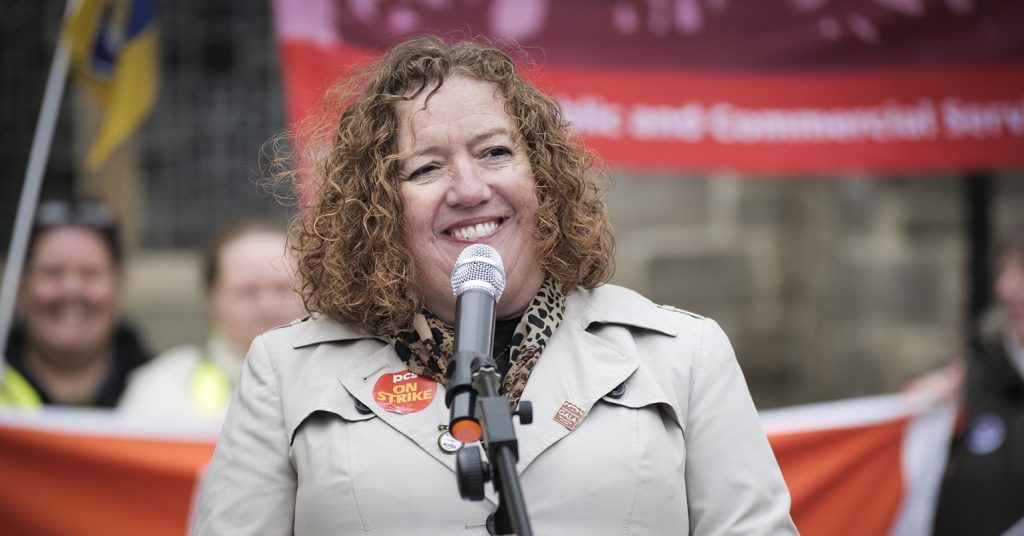Labour could have blocked the government’s latest anti-union laws. They chose not to.

Unions and their members woke this morning in a new world, one in which the “hostile environment” for their collective work, the already highly restrictive framework of laws in place for decades over successive governments, got a lot tighter. And this a world in which the Labour Party failed to act – as it could have done – to stop this tightening.
Looking on the positive side, this has, as TUC chief Paul Nowak said, the opportunity to be a “galvanising moment” for workers. Unite leader Sharon Graham has said union leaders have to commit to act “outside the law” if necessary.
But it is not much of a positive, given that unions face fines of up to £1m, and are now legally responsible for, as the Royal College of Nursing (RCN) put it “breaking their own strikes”. And individual workers, contrary to what Minister Kevin Hollinrake said in the Commons, face the sack if they fail to comply with a work notice.
The setting of “minimum service levels” – as the new rules and code of practice do – is not a matter for mapped out statutory consultation. The minister can consult whoever they like – the government just laid out the rules for three work areas last week, and will be doing more. There is no independent process of meditation or judgement, as there is in European nations with superficially similar laws.
How did we get to this place? There were two stages. The first was the passing of the Minimum Service Levels Bill (now Act). Hurried through the Commons, the House of Lords expressed considerable legal and practical concerns, but eventually, after several rounds of “ping-pong” gave way, as it usually does. The line, as per the standard pattern, that we are “the unelected House” came out – a powerful reason to have an elected House, that might be more prepared to stand firm when the government is clearly acting wrongly and/or unwisely.
But implementing the law requires regulations, for each sector, and the passing of a Code of Practice to guide behaviour under the law. That was what was being discussed last week and the RCN and British Medical Association both clearly called for the code and the rules for ambulance and patient transport services to be thrown out.
The TUC identified multiple problems with the Code, and with the package of rules for the Border Force and passenger rail services, notably that for many workers this means the practical ending of any right to strike. If you work at a small port or airport, or operate crucial signals, your rights are gone. Procedurally, there was also concern that many measures in the Code should have been in the original bill, so subject to amendment (as regulations are not).
The Green Party concluded the code and the rules for the three sectors should have been thrown out, and so I tabled what is known as “fatal motions” to do just that. Signals from the Liberal Democrats were that they would support the fatal motions if Labour did. But Labour did not, whipping its peers to abstain.
All credit to them, several Labour peers on the floor of the house – Lord Hendy, Lord Sikka, Lord Rooker indicated that they would support the fatal motion, as did several others privately.
Various explanations for this decision to whip for abstention on the fatal motion were advanced by Labour. One was that they could not win. Not, I would suggest, a reason not to try.
I cannot know for sure what would have happened had I been able to call a vote with Labour and Liberal Democrat backing. Some of the crossbenchers (the non-party peers) who hold the balance of power in the House had indicated to me they would support a fatal motion. And when Labour put its “regret” motion, which expressed disapproval but did nothing to stop it, the first vote was won, so there were potentially the numbers in the House.
Secondly, Labour said that the House by convention does not pass fatal motions. Well that is not the case. In fact, the Labour Party themselves organised a revolt that rejected secondary legislation in 2012. Fatal Motions are a way that peers can point out that the Minister is trying to go further than what is in the legislation, something the Labour Party say that the strike ban rules are doing.
It is therefore extraordinary that the Labour Party, which grew out of the 1901 Taff Vale legal action against striking railway workers, whose union was sued for damages by the employers, did not support my Fatal Motion. This fear of trade unionists been stopped from striking and unions been crippled by fines is exactly what motivated working people to set up the Labour Representation Committee and get MPs elected.
Sir Keir Starmer is saying that he will repeal the anti-union laws, but that could be a year or more away – and Labour has backpedalled already on many things that it has promised, before even the pressure of an election campaign. The damage that could anyway be done to unions in that time could be immense.
PS. We hope you enjoyed this article. Bright Green has got big plans for the future to publish many more articles like this. You can help make that happen. Please donate to Bright Green now.
Image credit: Roger Blackwell – Creative Commons




Natalie needs a column in a national newspaper. The Green Party should have kept her on as leader. I dont think people realise we need spokes people ordinairy people can relate to.